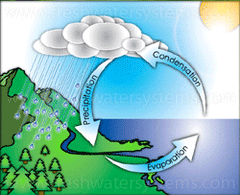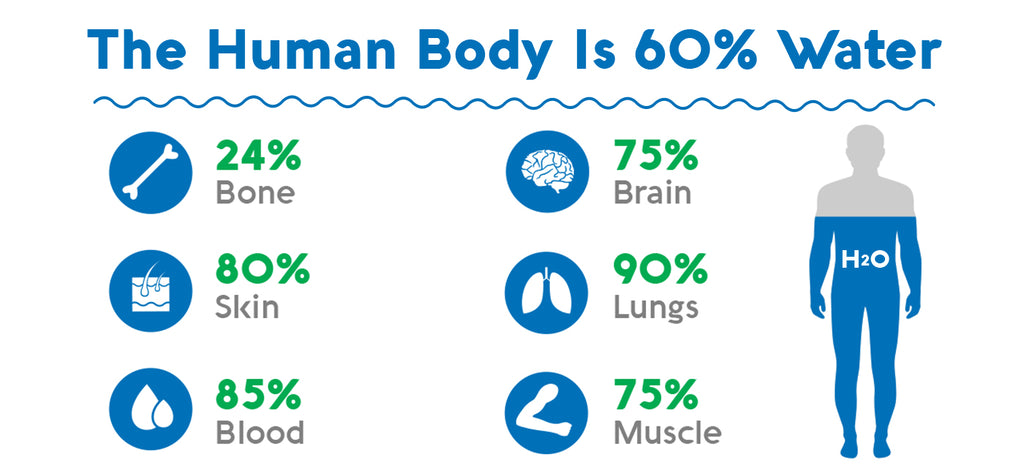Distilled water is the purist form of water a treatment system can provide. In fact, it is the choice of laboratories and pharmacies because of its high purity. A water distiller removes 99.9% of dissolved inorganics, bacteria, and chemicals from water. Despite its high quality, whether or not distilled water is safe to drink is not easy to determine. The effects of drinking distilled water remain an under-researched and frequently debated topic. Essential minerals like calcium, magnesium, and sodium are removed from distilled water along with the harmful contaminants, leading some to worry about whether it is dangerous to consume.
Table of Contents
What is distilled water?Is distilled water safe to drink?Should you drink distilled water? Is distilled water good for you?What pH is distilled water?Is bottled water distilled?Does distilled water go bad?Alternatives to distilled waterTo understand the advantages and disadvantages of distilled water, we must consider water's role in the body, the sources of essential minerals, and how the body uses minerals. We are water filtration experts, not scientists or medical professionals, so we have researched common arguments and scientific facts to help you decide if distilled water is the best choice for your health.
What is distilled water?
Distilled water is water that has been purified by a water distiller by converting water into steam, leaving contaminants, bacteria, and minerals behind. As the steam cools, it condenses back into a liquid and drops into a collection container. Distillation mimics nature's process of recycling water, known as the hydrologic cycle. Home water distillers have one chamber where water evaporates and another where the steam is collected.
 |
 |
Learn more: How do water distillers work?
Is distilled water safe to drink?
Yes, distilled water is safe to drink, but you should consider other forms of water if you regularly exercise intensely, are malnourished, or suffer from an illness or mineral deficiency. While it is safe to drink in most cases, distilled water contains a distinctly flat taste because of the lack of minerals. Distillation purifies water in a natural process, similar to the earth's hydrologic cycle. There are no added chemicals or disinfectants in the water that can harm you. However, the absence of these contaminants is the source of concern.
A water distiller is so good at removing substances from water that nearly everything, including dissolved minerals, is removed. Some of these essential minerals, or electrolytes, are used by the body to carry signals between cells. Our bodies obtain electrolytes primarily through food. Water contains only trace amounts of minerals, but is it enough to make a significant impact? That depends on your health, nourishment, and level of physical activity.
Common arguments about drinking distilled water:
- Drinking distilled water creates health problems from the lack of essential nutrients and causes dehydration.
- Drinking distilled water is never a bad idea because the body cannot absorb dissolved minerals from water into the tissue.
- Drinking distilled water can be beneficial, but may not be the best choice for everyone, especially if the minerals are not supplemented by another source.
Water makes up 60% of the human body, so you must ensure that the water you consume is safe and beneficial. We want to provide you with the information needed to determine whether you should choose distilled water or an alternative.
Should you drink distilled water?
You can drink distilled water as long as you obtain the nutrients your body needs from your diet. Water is not meant to be a main source of mineral intake. If you sweat intensely from regular exercise or are malnourished, mineralized water may help, but water will otherwise not play a major role in your nutrient intake. As intense athletes sweat, they lose electrolytes rapidly. To stay hydrated, drinking water with minerals or a sports drink with added electrolytes may aid performance. If you are sick and vomiting frequently, then your body also needs help replacing electrolytes. If you are malnourished, then you need all the minerals you can get, and water may be your most available option.
Distilled water is one of the purest forms of water you can drink. Bacteria and dissolved substances like lead or arsenic endanger your health if not removed. In such cases, the pros of distilled water far outweigh the cons. People trying to limit their sodium intake could also benefit from distilled water.
Benefits of distilled water
- 99.99% of harmful dissolved solids and bacteria removed
- Contains no chemicals
- Contains no sodium
- Prevents scale on appliances
Disadvantages of distilled water
- Uses energy during treatment
- Takes long to treat (3-4 hours to produce a gallon)
- Tastes flat
- Contains no mineral content
References
- (2005). Nutrients in drinking water. World Health Organization. http://www.who.int/iris/handle/10665/43403
- Institute of Medicine (US) Committee to Review Dietary Reference Intakes for Vitamin D and Calcium; Ross AC, Taylor CL, Yaktine AL, et al., editors. Dietary Reference Intakes for Calcium and Vitamin D. Washington (DC): National Academies Press (US). (2011). Available from: https://www.ncbi.nlm.nih.gov/books/NBK56070/ doi: 10.17226/13050
- National Research Council (US) Safe Drinking Water Committee. Drinking Water and Health Volume 3. Washington (DC): National Academies Press (US); 1980. V, The Contribution of Drinking Water to Mineral Nutrition in Humans. Available from: https://www.ncbi.nlm.nih.gov/books/NBK216589/
- Popkin, B. M., D'Anci, K. E., & Rosenberg, I. H. Water, Hydration, and Health. (2010). Nutrition reviews, 68(8), 439–458. doi:10.1111/j.1753-4887.2010.00304.x
- Kravitz, L. Ph.D. Water: The Science of Nature's Most Important Nutrient. (n.d). The University of New Mexico. Available from https://www.unm.edu/~lkravitz/Article%20folder/WaterUNM.html
- Misner B. Drinking Distilled Water- Are the effects Positive or Negative? - An Opinion. WebmedCentral NUTRITION 2011;2(12):WMC002554
doi: 10.9754/journal.wmc.2011.002554
Is distilled water good for you?
Distilled water is good for you in the sense that it will not make you sick if it is stored properly. It is the purest form of water you can drink, so unless you have some form of nutrient deficiency, it performs its job well. Water contains trace amounts of dissolved minerals that may be absorbed in the body. If the body could not absorb inorganic minerals at all, then we would not bother filtering them out of drinking water. However, dissolved minerals are not as easily absorbed as organic compounds, and we receive most of our essential minerals through food. Distilled water may not be a good choice during intense exercise or when you're sick or malnourished. In most cases, distilled water is not unhealthy.
Why do you need water?
Drinking water benefits us in several ways:
- Lubricates joints
- Protects cells and vital organs
- Keeps the body from overheating
- Helps remove waste
- Dissolves nutrients
Supplying you with essential minerals is not one of water's primary responsibilities. If your body is deficient in minerals or other nutrients, drinking water is not the first solution. The body can get trace amounts of minerals from water and some water from food. However, we don't drink water for more nourishment, just like we don't eat food to recover from dehydration. Water's job is to dissolve the minerals you eat so they can easily flow to other parts of the body.
Water moves through cells and tissues to balance the concentration of solutes and maintain homeostasis, or equilibrium. Water is contained either inside of cells (intracellular fluid) or outside of cells (extracellular fluid).
- Intracellular fluid (ICF): 2/3 of water in the body
- Extracellular fluid (ECF): 1/3 of water in the body
Plasma contains 20% of the ECF and transports minerals including electrolytes.
Here's how: Hydrostatic pressure pushes plasma along with nutrients into cell membranes and tissues. Water flows through a membrane unrestricted, but solutes do not. Many ions, including electrolytes, must be forced through cells and tissues via active transport, which requires extra energy. Passive transport does not require extra energy, but the molecules must be able to pass through the membrane on their own, which is more difficult for ions (Rice University, 26.1).
What does this tell us? Electrolytes, whether from food or water, do not pass through cell membranes and tissues as easily as water. This means that when you drink mineral water, only a portion of that low mineral content actually benefits the body.

Why do you need minerals?
Electrolytes are essential minerals that carry signals between cells and transport fluids into your muscles and keep them from cramping. Fruits and vegetables are the best supplements for mineral deficiencies. Calcium, for example, is best supplemented with sunlight and foods, such as fish and eggs, that are rich in vitamin D.
According to the World Health Organization:
"Individuals who would receive the greatest benefit from the presence of minerals in drinking water are those individuals with marginal intakes from food sources. In the United States, the 50th percentile dietary intakes from food appear to be adequate in most cases, with the exception of iron intakes by women" (2005, p. 88).
If you're malnourished, then you may not be able to replace minerals through food and rely on the mineral content in water. But in the U.S., an excess of certain minerals is a greater problem than a lack of nourishment. For example, many people consume 130-160 mmol/day of sodium a day, but our bodies only require 1-2 mmol/day, which is why high blood pressure (hypertension) is a common problem (Rice University, 26.3).
Learn more: Recommended nutrient intakes from the National Institutes of Health
What does the body do with extra minerals?
When the body takes in too many minerals, the kidneys get rid of them. Your kidneys function better the more water you drink. Hydration is important because water protects the kidney from exhaustion. Whenever our bodies have more minerals than we need, our brain signals us to drink more water. If you've spent the afternoon at the movie theater eating a large bucket of salty popcorn and feel parched, here's what's happens:
- Sodium collects in the ECF.
- The ECF takes water from the ICF.
- The brain receives signals from the cells that there's an over-concentration of sodium.
- You feel thirsty and realize you need to drink more water. If you don't, you get dehydrated.
In this instance, distilled water would be a good option because you don't need extra sodium from water. It's possible that if your water contains contaminants or excess mineral content, filtering it helps reduce the work of your kidney.
Learn more: Can you cook with distilled water?
What pH is distilled water?
Pure distilled water always has a pH of 7, but distilled water that comes into contact with air has a pH of slightly less than 7. Because water distillation purifies water so well, distilled water is pH neutral directly after purification. However, the water absorbs carbon dioxide from the air and reacts with it to form carbonic acid. The pH of water can drop to as low as 5.8 in about two hours of exposure to carbon dioxide.

Is bottled water distilled?
Bottled water is not distilled. Rather, it undergoes some other form of treatment process, typically reverse osmosis. The differing tastes of bottled water brands stem from the minerals added to the water after filtration and can also be affected by where the brand sources its water from. The cost and time of water distillation at that scale renders other treatment systems far more favorable than distillation.
Does distilled water go bad?
When stored properly, unopened store-bought distilled water can last for at least five years. If the water does not come into contact with any contaminants, it can last indefinitely. An opened container of distilled water, on the other hand, is safe to drink for a few weeks and can be used for appliances for about a year. The biggest threats to contaminate distilled water are bacteria and chemicals absorbed through plastic packaging. To extend the water’s shelf life, ensure a proper seal, keep it in the refrigerator, and store it in a glass bottle once opened.
How to store distilled water
The way distilled water is stored will greatly affect its shelf life. If your water is unopened, ensure that the seal remains firmly fastened and undisturbed. Whether opened or unopened, storing distilled water in the refrigerator can greatly extend its shelf life, especially when already opened. If you plan to store opened distilled water for an extended period of time, storing it in a glass bottle in the refrigerator will minimize the risk of chemical contamination via plastic packaging. If you are using distilled water for applications other than drinking, contamination may not be as important. However, if distilled water is affected by certain contaminants, it can defeat the purpose of using distilled water for that application in the first place.
Signs of bad distilled water
Distilled water can show multiple symptoms that are clearly noticeable when the water has been contaminated. These include:
- Cloudiness
- Algae growth
- Chemical taste
If your distilled water exhibits any of these symptoms, it is not safe to drink or to use in other applications.
Alternatives to distilled water
If you don't think distilled water is the best choice for you, then a carbon filter, reverse osmosis system, or an ultrafiltration system may be a more suitable option.
If you don't think distilled water is the best choice for you, then a carbon filter, reverse osmosis system, or an ultrafiltration system may be a more suitable option.

Carbon filter
If TDS in your water is not a concern, then a water distiller may do more than you need. An activated carbon filtration system removes chlorine and other chemicals, as well as contaminants that cause foul tastes and odors. Some carbon filters are also rated to remove lead or cysts. Refrigerator filters utilize activated carbon cores, so they are also an effective solution if chlorine is your main concern.
Learn more: Activated carbon filters 101 | Do refrigerator filters really work?
Reverse osmosis system with a remineralizing filter
Reverse osmosis does not remove as many minerals as a water distiller, but it also does not require extra energy. A reverse osmosis system removes VOCs in addition to dissolved solids. You can purchase a system with a remineralizing filter that replaces some of the essential minerals lost. If you're worried about using an RO system due to the amount of wastewater produced, then find one with a permeate pump. A permeate pump increases efficiency by as much as 85 percent.
Learn more: What is a reverse osmosis system?
Ultrafiltration system
If you need to remove microscopic contaminants while retaining dissolved minerals, then an ultrafiltration system is the best option. The ultrafiltration membrane blocks particles 5,000 times smaller than a human hair, but the pores are not large enough to remove dissolved solids. An ultrafiltration system operates on low pressure and does not produce wastewater.
Learn more: How ultrafiltration works
If you have any additional questions, please do not hesitate to contact us.

Couldn’t one just add a drop of trace minerals to his distilled water and have the best of all the options mentioned in the article?